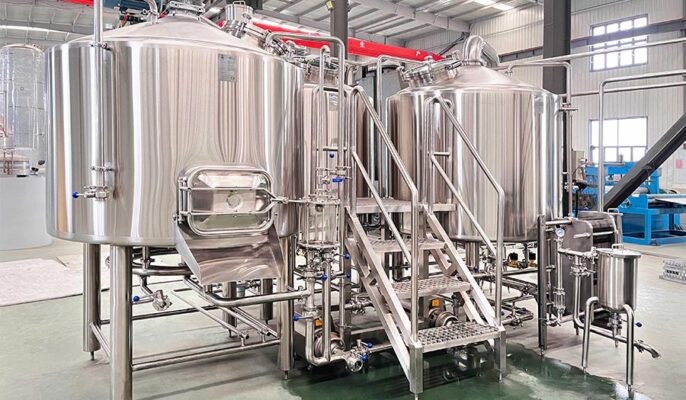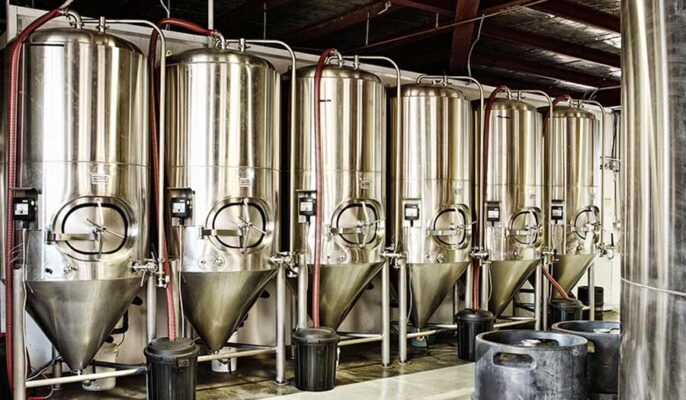Brewery equipment is the machinery and tools used to produce beer, cider, or any other fermented beverage. Micet provides quality brewing equipment for industrial use. We work with breweries around the world to design and manufacture custom brewhouses, cellar tanks, and a variety of other complex brewery-specific support vessels and systems. The Micet team has decades of experience in brewery equipment, brewing, process engineering, manufacturing hygienic stainless steel systems, and integrating automation and control systems.
Small and Startup Brewery Solutions
One of the major costs of starting a small brewery is brewery equipment. Here is a comprehensive list of equipment needed:
- Custom brewery 3 – 30 BBL
- Cellar water tank 3 – 30 BBL
- 2, 3, 4 and 5 container configurations
- Hot and cold wine tanks
- Boilers and chillers
- Système de manutention des grains
- Installation support services
- Special craft brewing containers: Hop Backs, frying pans, etc.
Reliability, quality and technical support are provided to the brewery, but may be worth the extra cost. There are other start-up costs, such as the cost of site renovations, barrels and other incidental brewing and commercial equipment. If you don’t have an existing route to market via pubs or bars, then in order for your brewery to be viable you will need to consider a larger brewery.

Solutions for medium-sized craft breweries
- Customized brewery 30-100 BBL
- Cellar Tank 30 – 400 BBL
- 2, 3, 4 and 5 container configurations
- Hot and cold wine tanks
- Installation support services
- Clean-in-place system
- Boilers and chillers
- Système de contrôle
- Portable pumps and flow meters
The specifications range from 3BBL to 10BBL, and the heating methods are flexible, including electric, gas and steam heating. The layout follows the architectural requirements and makes full use of space. We are here to help amateur brewers who want to get into the beer industry with good and reasonable solutions and use brewery systems for easy and simple brewing. Make the system integrate well with your existing brewing knowledge.
Large brewery solutions
Large breweries need extensive equipment and machinery to produce beer on a commercial scale. The equipment enables key processes such as brewing, fermentation, filtration and packaging. The main types of large brewery equipment include:
- Brewery: Contains saccharification barrels, filter barrels, brewing kettles and whirlpool tanks, used for saccharification, filtration, boiling wort and separation of residues.
- Fermentation system: It consists of a fermentation tank and a regulating tank and is used for the primary fermentation and aging of beer.
- Filtration equipment: plate filter, centrifuge or diatomaceous earth filter for clarifying and stabilizing beer.
- Packaging line: high-speed bottling, canning, barreling and barrel filling systems.
- Auxiliary equipment: grain handling, cleaning, quality control laboratory, cooling, CIP, automation, etc.
The size and complexity of the equipment depends on the brewery’s production volume and budget. Key considerations for large breweries include efficiency, consistency, reliability, low operating costs and the flexibility to produce different beer styles.
Brasserie réservoirs en acier inoxydable
We manufacture a variety of stainless steel tanks using some of the highest grades of stainless steel on the market. Our top-quality steel tanks are easier to clean and maintain. Safety is an important aspect of the design of all our professional beer brewing equipment, ensuring brewers are safer and helping to avoid major hassles during inspections.
The following are common tank types:
- Cellar water tank
- Hot and cold wine tanks
- Boilers and chillers
- Customized storage tanks

Brewery Other Options
The brewery also has some extra equipment for various purposes:
- Pasteurization system
- Cleaning in place (CIP) system
- Pump truck
- Clean-in-place system
- Système de contrôle
- Portable pumps and flow meters
- Échangeur de chaleur
- filling system
Brewery equipment features
Each piece of equipment in the brewing process has a specific function that, if performed, results in the perfect pint.
- Grinding equipment: The first step in brewing is to prepare the grains. Milling equipment crushes the grains, ensuring that the husks remain intact. This crushing facilitates the release of starch during saccharification.
- Mash Tun: Here, crushed grains are soaked in water and heated. This process, called mashing, helps convert the starch in the grain into fermentable sugars.
- Lauter Tun: After mashing, the liquid part (now called wort) needs to be separated from the chaff. This separation occurs in the filter barrel.
- Kettle boiling: The wort is then boiled and hops are added at various stages. Boiling not only sterilizes the wort, it also extracts flavor and bitterness from the hops.
- Cuve de fermentation: After boiling, the wort is cooled and transferred to the fermentation vessel. When yeast is added, it begins to consume the sugar in the wort, producing alcohol and carbon dioxide. The type and strain of yeast and fermentation conditions affect the taste of beer.
- Brite Tank: After fermentation, the beer needs to be cleaned of any suspended particles and carbonated. This happens in the beer can, ensuring the beer looks appealing and has the right amount of foam when poured.
Brewery equipment applications
- Cider production: Like beer, cider is a fermented beverage. While the main ingredient changed from grain to apple, much of the brewing equipment remained the same, especially the fermentation tanks and bottling line.
- Kombucha Brewing: Kombucha is a fermented tea popular for its recognized health benefits. Brewing equipment, especially fermenters, is crucial in its commercial production.
- Craft beverage experimentation: With the rise of craft beverage culture, many producers are experimenting with unique ingredients and fermentation techniques. Brewing equipment became the proving ground for such innovations.
- Brewery: Although the main focus of brewing equipment is fermentation, some components can also be used in breweries, especially fermenters. Distilleries produce spirits such as whiskey, which undergo a fermentation process like that of beer.
- Non-alcoholic beverages: Some non-alcoholic beverages, such as root beer and certain craft sodas, use brewing equipment during the production process, particularly during the flavor infusion and carbonation stages.
Comment choisir un équipement de brasserie ?
Whether it’s a home hobby or a commercial enterprise, choosing the right brewing equipment is crucial to the success of your brewing business.
Considerations When Choosing Brewing Equipment:
| FACTEUR | CONSIDERATION |
| Échelle | Homebrewing, Microbrewery, Commercial Brewery |
| Budget | Initial cost, Maintenance, Upgrades |
| Marque | Reputation, Reviews, After-sales service |
| Caractéristiques | Automation, Digital Displays, Cleaning systems |
| Matériau | Stainless Steel, Copper, Plastic (for certain components) |
| Space & Placement | Size of equipment, Ventilation, Accessibility |
Why choose our brewery equipment?
Micet prioritizes quality and innovation, with state-of-the-art manufacturing facilities and strict quality control processes. Offers extensive customization options and professional technical support. From home brewing kits to large commercial systems, there are products to suit every size and brewing style. Micet offers integrated solutions covering the entire brewing process. This means brewers can source all equipment from a single supplier, ensuring compatibility and seamless integration.




